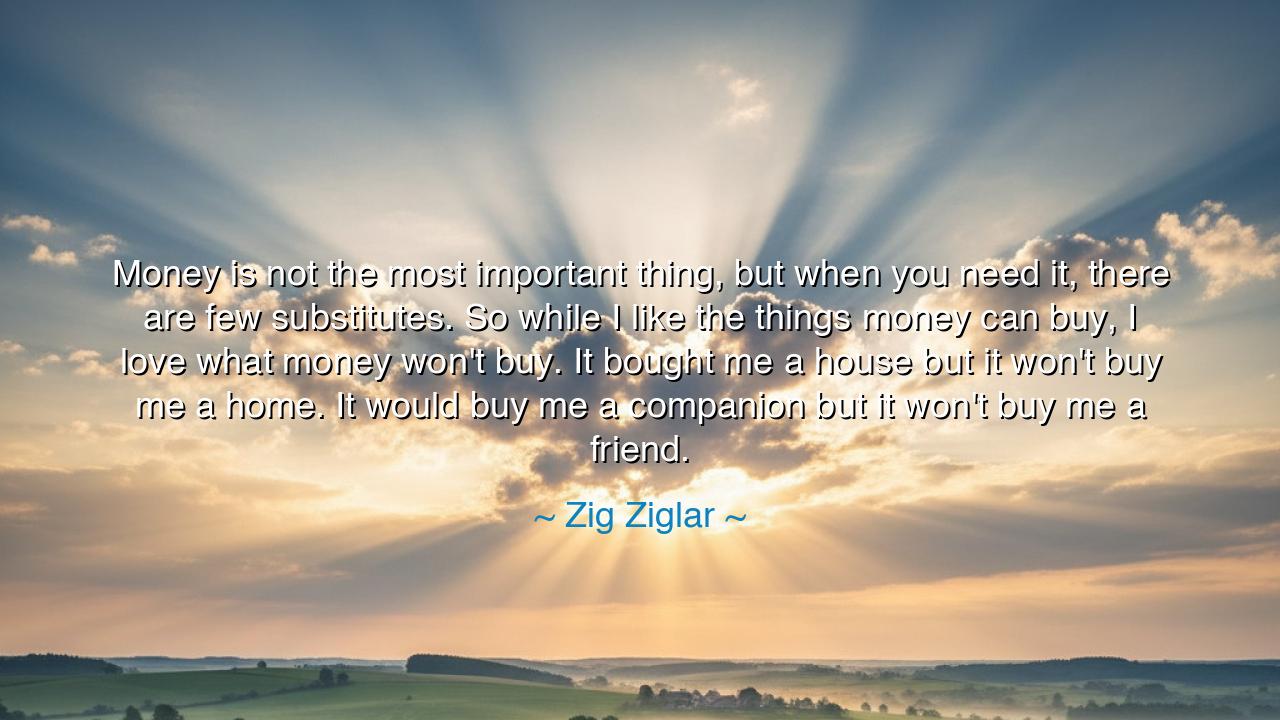
Money is not the most important thing, but when you need it
Money is not the most important thing, but when you need it, there are few substitutes. So while I like the things money can buy, I love what money won't buy. It bought me a house but it won't buy me a home. It would buy me a companion but it won't buy me a friend.






“Money is not the most important thing, but when you need it, there are few substitutes. So while I like the things money can buy, I love what money won't buy. It bought me a house but it won't buy me a home. It would buy me a companion but it won't buy me a friend.” Thus spoke Zig Ziglar, a man of both business and spirit, whose words bridged the gap between the material and the eternal. In this teaching, he offers not a condemnation of wealth, but a call to wisdom — to remember that while money can serve, it must never rule. He does not reject prosperity, but seeks to remind the heart that the most valuable treasures are beyond purchase, born not of gold but of grace, character, and love.
The origin of this quote springs from Ziglar’s life as one of the most influential motivational speakers of the modern age. Rising from humble beginnings in Mississippi, he knew poverty firsthand — the sting of want, the weight of struggle. Through hard work and faith, he built success, but unlike many who become consumed by fortune, he never forgot the limits of money’s power. He saw that wealth could build walls but not bonds, that it could decorate the world but not fill the soul. His words became a compass for those who had gained the world but felt hollow within, reminding them that the heart’s riches are measured not in currency but in connection.
When Ziglar says, “Money is not the most important thing, but when you need it, there are few substitutes,” he speaks with balance — a virtue the ancients revered. He acknowledges that money has its rightful place. It can buy food for the hungry, shelter for the weary, medicine for the sick. It is a tool — powerful, necessary, and, in moments of need, irreplaceable. Yet it remains a servant, not a master. To elevate money beyond its role is to invite bondage of a subtler kind — the enslavement of the soul to possessions. The wise understand that money can sustain life, but it cannot give it meaning.
This truth has echoed throughout history. Consider the story of King Midas, who, longing for wealth above all else, was granted the power to turn everything he touched into gold. At first, he rejoiced — his palace gleamed with endless treasure — but soon, the curse revealed itself. The bread he touched turned to metal; his daughter, whom he embraced, became lifeless gold in his arms. In the end, he begged the gods to take back his gift. So it is with all who forget Ziglar’s wisdom: when money becomes the measure of worth, life itself loses warmth. Wealth without love becomes a desert, glittering but barren.
“It bought me a house but it won’t buy me a home.” In this single line lies a truth as profound as any sacred teaching. A house is a structure — walls, roof, foundation — but a home is made of spirit. It is built not with lumber, but with laughter; not with glass, but with trust. The poor may dwell in a hut and yet feel at home, while the rich may sleep in a mansion and feel like strangers in their own lives. Similarly, “It would buy me a companion but it won’t buy me a friend.” For companionship may be rented, but friendship must be earned. True friends stand beside you not for gain, but for love. Money may attract company, but only kindness keeps it.
Ziglar’s wisdom speaks to a universal hunger — the search for meaning beyond material success. The modern world dazzles with abundance, yet many hearts are starving. We build taller towers and deeper vaults, but forget to build deeper relationships, stronger faith, and quieter gratitude. The lesson is not to reject wealth, but to reorder priorities. To use money as a tool for goodness, not as a badge of worth. To let success serve humanity, not consume it.
The lesson, then, is clear and timeless: pursue what cannot be bought. Seek honesty over opulence, compassion over comfort, and purpose over possessions. Use money wisely — to heal, to build, to bless — but do not let it master your heart. Remember always that a life rich in love, in friendship, in faith, is the only life that endures beyond the grave. You may leave your gold behind, but you carry your goodness with you.
So, remember the words of Zig Ziglar: money can buy you things, but not meaning; comfort, but not contentment. Let it build your house, but not your soul. For the soul’s currency is kindness, gratitude, and love — wealth that cannot rust, cannot fade, and cannot be taken away. Treasure that, and you will be rich beyond measure.






AAdministratorAdministrator
Welcome, honored guests. Please leave a comment, we will respond soon